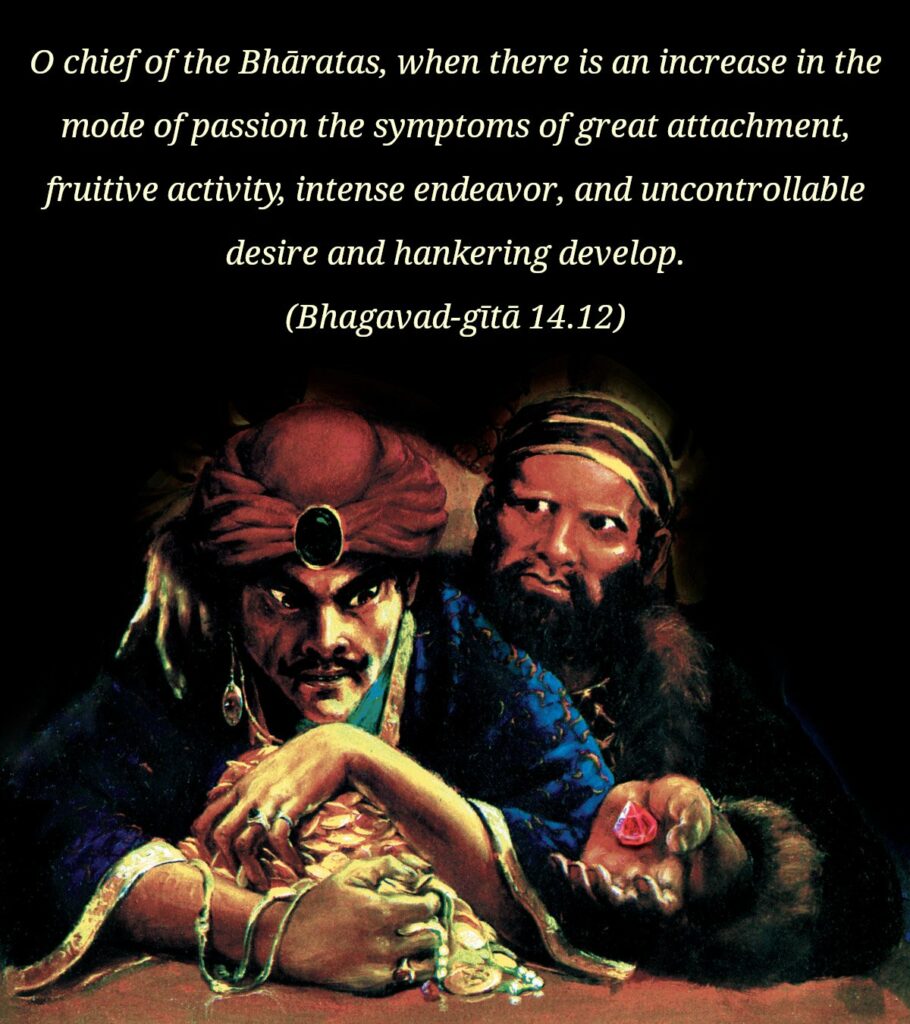लोभ: प्रवृत्तिरारम्भ: कर्मणामशम: स्पृहा |
रजस्येतानि जायन्ते विवृद्धे भरतर्षभ || 12||
lobhaḥ pravṛittir ārambhaḥ karmaṇām aśhamaḥ spṛihā
rajasy etāni jāyante vivṛiddhe bharatarṣhabha
lobhaḥ—greed; pravṛittiḥ—activity; ārambhaḥ—exertion; karmaṇām—for fruitive actions; aśhamaḥ—restlessness; spṛihā—craving; rajasi—of the mode of passion; etāni—these; jāyante—develop; vivṛiddhe—when predominates; bharata-ṛiṣhabha—the best of the Bharatas, Arjun;
Translation:
Greed, activity, enterprise, unrest, longing— these arise, Ο lord of the Bhāratas, when rajas prevails.
Commentary:
When Rajo-guna dominates, man burdens himself with a hundred kinds of activities. The result is he is restless. Greed and longing urge him to undertake many actions for the fulfillment of his desires. These desires are sometimes selfish and prohibited by the Sastras. Longing for objects drives him into acts of evil and sin. He employs tricks and stratagems to realise his ambitions. He has no regard for truth. His mind is externalised. He has no introspection. He is like the ocean troubled by a tempest. His words are harsh and proud. He walks unsteadily because of his mental restlessness. His mind is full of desire for this and that. So he lives a life of passion, and does not know what is peace and real joy. Ravana is an example of Rajoguna. Rajo-guna, therefore, leads to evil and self-destruction. It should be overcome by perseverance and firm effort. Peace and joy cannot be found in Rajo-guna.
On 13 July 1885, the Master (Sri Ramakrishna) went to attend the Chariot Festival at Balaram’s house in Calcutta. Tejchandra went there to see the Master.
Master (to Tejchandra): “I send for you so often. Why don’t you come? If you practise meditation and prayer it will make me happy. I look on you as my own; that is why I send for you.”
Tejchandra: “Sir, I have to go to the office. I am very busy with my duties.”
M.: “There was a marriage ceremony at his home and he got leave from his office for ten days.”
Master (to Tejchandra): “Well, well! You say you have no leisure. You told me just now that you were going to renounce the world.”
Narayan: “M. said to us one day that this world is a wilderness.”
Master (to M.): “Please tell them the story of the disciple who became unconscious after taking some medicine. His teacher arrived at the house and said he would revive if someone else swallowed a pill that he would prescribe. The disciple would get back his life, but the man who swallowed the pill would die.
“Please tell the other one, too, of the hatha yogi who thought that his wife and children were his very own, and who feigned death with his limbs stretched out. It will do them good to hear those stories.”
Question: What is the nature of man dominated by Rajo-guna?
Answer: Greed, activity, undertakings (prompted by desire and prohibited by the Sastras), restlessness, longing for worldly enjoyments are the qualities of the Rajasic man.
Question: Who attains peace?
Answer: He who has freed himself from Rajas and Tamas.
Bhagavad Gita: Chapter 14 🔻 (27 Verses)
